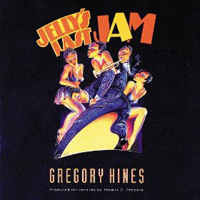 Original Broadway Cast, 1992 (Mercury)
Original Broadway Cast, 1992 (Mercury)  (4 / 5) With a score inventively cobbled together from Jelly Roll Morton’s musical catalogue, Jelly’s Last Jam tells the composer’s life story in a show that is as moving as it is entertaining. Luther Henderson (musical adaptation), Susan Birkenhead (new lyrics), and George C. Wolfe (director) used songs not originally written for the theater to propel the plot forward, and this recording proves the excellence of their efforts. The show benefited enormously from ideal casting. Gregory Hines received a well-deserved Tony Award for his star turn as Morton. His smooth vocals and crisp tapping quicken the pulse and gladden the soul in one highlight after another: “Doctor Jazz,” “That’s How You Jazz,” the hauntingly sung and acted “Creole Boy,” and others. Another Tony winner for this show, Tonya Pinkins as Anita, sings “Play the Music for Me” and “Last Chance Blues,” a tough duet with Hines. There’s also notable ensemble work by “The Hunnies”: Mamie Duncan-Gibbs, Stephanie Pope, and Allison Williams. The booklet accompanying the CD edition of the recording includes a concise synopsis and all the lyrics. — Morgan Sills
(4 / 5) With a score inventively cobbled together from Jelly Roll Morton’s musical catalogue, Jelly’s Last Jam tells the composer’s life story in a show that is as moving as it is entertaining. Luther Henderson (musical adaptation), Susan Birkenhead (new lyrics), and George C. Wolfe (director) used songs not originally written for the theater to propel the plot forward, and this recording proves the excellence of their efforts. The show benefited enormously from ideal casting. Gregory Hines received a well-deserved Tony Award for his star turn as Morton. His smooth vocals and crisp tapping quicken the pulse and gladden the soul in one highlight after another: “Doctor Jazz,” “That’s How You Jazz,” the hauntingly sung and acted “Creole Boy,” and others. Another Tony winner for this show, Tonya Pinkins as Anita, sings “Play the Music for Me” and “Last Chance Blues,” a tough duet with Hines. There’s also notable ensemble work by “The Hunnies”: Mamie Duncan-Gibbs, Stephanie Pope, and Allison Williams. The booklet accompanying the CD edition of the recording includes a concise synopsis and all the lyrics. — Morgan Sills
All posts by Michael Portantiere
Jekyll & Hyde
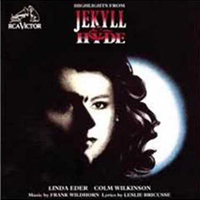 Studio Cast, 1990 (RCA)
Studio Cast, 1990 (RCA)  (2 / 5) As a musical theater composer, Frank Wildhorn writes great pop songs. That’s amply demonstrated by this “concept” recording of Jekyll & Hyde, which lacks any theatrical context. Some of the songs, with lyrics by Leslie Bricusse, evoke moments from Les Misérables and The Phantom of the Opera but are less interesting musically and dramatically. Colm Wilkinson and Linda Eder co-star in this two-person recording; in grand pop-opera style, they let few vowels go unmodified, and never exercise emotional shading where over-emoting will do. Eder seems clueless as to character nuance; still, her robust voice can overcome the sentiments of Bricusse’s lyrics, sell a soft ballad such as “Once Upon a Dream,” and strongly deliver the power ballads “Someone Like You” and “A New Life.” Jekyll & Hyde was always less about Jekyll or Hyde than about showcasing Eder’s voice. Although Wilkinson sinks his teeth into his songs, particularly “This Is the Moment,” his performance is so far over the top that all we can do is grin and bear it until it’s Eder’s turn to sing again. We never have to wait very long. — Matthew Murray
(2 / 5) As a musical theater composer, Frank Wildhorn writes great pop songs. That’s amply demonstrated by this “concept” recording of Jekyll & Hyde, which lacks any theatrical context. Some of the songs, with lyrics by Leslie Bricusse, evoke moments from Les Misérables and The Phantom of the Opera but are less interesting musically and dramatically. Colm Wilkinson and Linda Eder co-star in this two-person recording; in grand pop-opera style, they let few vowels go unmodified, and never exercise emotional shading where over-emoting will do. Eder seems clueless as to character nuance; still, her robust voice can overcome the sentiments of Bricusse’s lyrics, sell a soft ballad such as “Once Upon a Dream,” and strongly deliver the power ballads “Someone Like You” and “A New Life.” Jekyll & Hyde was always less about Jekyll or Hyde than about showcasing Eder’s voice. Although Wilkinson sinks his teeth into his songs, particularly “This Is the Moment,” his performance is so far over the top that all we can do is grin and bear it until it’s Eder’s turn to sing again. We never have to wait very long. — Matthew Murray
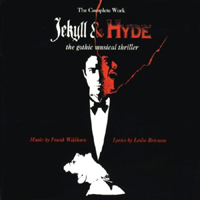 Studio Cast, 1994 (Atlantic)
Studio Cast, 1994 (Atlantic)  (3 / 5) Linda Eder returned for the second Jekyll & Hyde recording, but here she sings only the songs of the prostitute Lucy; Carolee Carmello was brought in as Jekyll’s fiancee, Lisa. The title roles are superbly filled by Australian actor-singer Anthony Warlow. From an acting standpoint, it might be said that both Warlow and Carmello are too good for the material; trying to make these pop tunes theatrical is a lost cause. The recording boasts a huge orchestra and tons of songs (the complete score up to that point), so if you simply must own one Jekyll & Hyde, this should probably be it. The plot is difficult to follow, but certain tracks are fun, including Eder’s saucy “Bring on the Men” and her powerful “Someone Like You,” Warlow’s dynamic “This Is the Moment,” and the Eder/Carmello duet “In His Eyes.” Many other numbers are silly, “Façade” and “Murder, Murder!” in particular. But, overall, Jekyll & Hyde has never sounded better than it does here. — M.M.
(3 / 5) Linda Eder returned for the second Jekyll & Hyde recording, but here she sings only the songs of the prostitute Lucy; Carolee Carmello was brought in as Jekyll’s fiancee, Lisa. The title roles are superbly filled by Australian actor-singer Anthony Warlow. From an acting standpoint, it might be said that both Warlow and Carmello are too good for the material; trying to make these pop tunes theatrical is a lost cause. The recording boasts a huge orchestra and tons of songs (the complete score up to that point), so if you simply must own one Jekyll & Hyde, this should probably be it. The plot is difficult to follow, but certain tracks are fun, including Eder’s saucy “Bring on the Men” and her powerful “Someone Like You,” Warlow’s dynamic “This Is the Moment,” and the Eder/Carmello duet “In His Eyes.” Many other numbers are silly, “Façade” and “Murder, Murder!” in particular. But, overall, Jekyll & Hyde has never sounded better than it does here. — M.M.
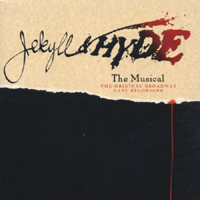 Original Broadway Cast, 1997 (Atlantic)
Original Broadway Cast, 1997 (Atlantic)  (1 / 5) By the time Jekyll & Hyde got to Broadway, it was more a parody of itself than a serious show. Linda Eder is still Lucy, and her pop affectations are out of place amid the theatrical acting/singing style of the Broadway cast members. Robert Cuccioli’s performance of Jekyll’s “This Is the Moment” joins the already hefty catalog of self-indulgent renderings, but he does a better job as Hyde. Of the leads, only Christiane Noll as Emma (the renamed Lisa) makes her character believable; she performs with sweetness, sensitivity, and a legitimately beautiful voice. Unfortunately, her songs are among the show’s dullest. “Murder, Murder” and the endlessly reprised “Façade” remain unintended comic highlights, and some newer numbers — “Pursue the Truth,” “Emma’s Reasons,” “I Must Go On,” and “Letting Go” — aren’t much better. The score reaches a new nadir with “Good ‘n’ Evil,” featuring such lyrics as “The key thing about good ‘n’ evil / Each man has to choose! / Heaven ‘n’ Hell / Is a helluva gamble to lose!” — M.M.
(1 / 5) By the time Jekyll & Hyde got to Broadway, it was more a parody of itself than a serious show. Linda Eder is still Lucy, and her pop affectations are out of place amid the theatrical acting/singing style of the Broadway cast members. Robert Cuccioli’s performance of Jekyll’s “This Is the Moment” joins the already hefty catalog of self-indulgent renderings, but he does a better job as Hyde. Of the leads, only Christiane Noll as Emma (the renamed Lisa) makes her character believable; she performs with sweetness, sensitivity, and a legitimately beautiful voice. Unfortunately, her songs are among the show’s dullest. “Murder, Murder” and the endlessly reprised “Façade” remain unintended comic highlights, and some newer numbers — “Pursue the Truth,” “Emma’s Reasons,” “I Must Go On,” and “Letting Go” — aren’t much better. The score reaches a new nadir with “Good ‘n’ Evil,” featuring such lyrics as “The key thing about good ‘n’ evil / Each man has to choose! / Heaven ‘n’ Hell / Is a helluva gamble to lose!” — M.M.
Jane Eyre
 Original Broadway Cast, 2000 (Sony)
Original Broadway Cast, 2000 (Sony)  (4 / 5) Based on Charlotte Brontë’s classic novel of sturm und drang on the English moors, the musical Jane Eyre represented the last gasp of the pop-opera cycle on Broadway. It managed to hang on for 209 performances, but tastes had shifted toward more lighthearted entertainments. The presence of director-librettist-co-lyricist John Caird (of Les Misérables fame) emphasized further how times had changed. Oddly, perhaps because of its intimate, introspective nature, a show that seemed stiff and uninvolving onstage fairly overflows with feeling as heard on this superbly well produced recording. Composer-lyricist Paul Gordon has a knack for melodic lines that are romantic and neurotic at the same time, and the lyrics are exceptionally literate. As Jane and Rochester, Marla Schaffel and James Barbour are the whole show, delivering abundant vocal thrills in such arias as “Sweet Liberty” and “The Pledge.” The song “As Good As You,” in which Rochester ruefully recalls his rakish past, is a gem of character revelation; so is the slashing, tormented “Painting Her Portrait,” in which Jane struggles to accept living life as a spinster. Throughout, Larry Hochman’s orchestrations have a plangent emotional transparency. This is a fine record of a show that may well be heard from again. — David Barbour
(4 / 5) Based on Charlotte Brontë’s classic novel of sturm und drang on the English moors, the musical Jane Eyre represented the last gasp of the pop-opera cycle on Broadway. It managed to hang on for 209 performances, but tastes had shifted toward more lighthearted entertainments. The presence of director-librettist-co-lyricist John Caird (of Les Misérables fame) emphasized further how times had changed. Oddly, perhaps because of its intimate, introspective nature, a show that seemed stiff and uninvolving onstage fairly overflows with feeling as heard on this superbly well produced recording. Composer-lyricist Paul Gordon has a knack for melodic lines that are romantic and neurotic at the same time, and the lyrics are exceptionally literate. As Jane and Rochester, Marla Schaffel and James Barbour are the whole show, delivering abundant vocal thrills in such arias as “Sweet Liberty” and “The Pledge.” The song “As Good As You,” in which Rochester ruefully recalls his rakish past, is a gem of character revelation; so is the slashing, tormented “Painting Her Portrait,” in which Jane struggles to accept living life as a spinster. Throughout, Larry Hochman’s orchestrations have a plangent emotional transparency. This is a fine record of a show that may well be heard from again. — David Barbour
Jamaica
 Original Broadway Cast, 1957 (RCA)
Original Broadway Cast, 1957 (RCA)  (2 / 5) Some Broadway musicals are timeless, while others spoke only to their era and audience and then were never heard from again. Jamaica is decidedly in the latter category. It was a hit for Lena Horne and the matchless team of Harold Arlen and E.Y “Yip” Harburg. Then, after a year-plus run, it vanished without a trace (other than this recording). Calypso was a ’50s phenomenon, and this score is full of it; in fact, Jamaica was originally written to star America’s calypso singer of choice, Harry Belafonte. When he proved unavailable, a rewrite gave movie star Horne a big-time Broadway debut. Her co-stars were notable as well: Interesting color-blind casting put Ricardo Montalban, a Mexican playing a West Indian, opposite Horne. Support was provided by Josephine Premice (husky-voiced and very entertaining), the personable Ossie Davis, and the veteran Adelaide Hall. The cast album is full of spirit and style, although the Jamaican patois sounds heavy-handed and phony coming out of Horne’s mouth. Arlen’s music is attractive but forgettable. Harburg failed to come up with a strong book (co-written with Fred Saidy and an uncredited Joseph Stein) and, in his lyrics, he mostly settles for a mix of faux-Caribbean attitude and obvious satire of Yankee consumerism and customs; not even the sultry “Coconut Sweet” is a truly worthy entry in the Arlen-Harburg canon of standards. While this recording cannot reproduce the show’s opulent designs and spicy Jack Cole choreography, it does give us a good idea of how Jamaica functioned: showcasing the dynamic Horne, moving swiftly, and providing very little of lasting value. — Richard Barrios
(2 / 5) Some Broadway musicals are timeless, while others spoke only to their era and audience and then were never heard from again. Jamaica is decidedly in the latter category. It was a hit for Lena Horne and the matchless team of Harold Arlen and E.Y “Yip” Harburg. Then, after a year-plus run, it vanished without a trace (other than this recording). Calypso was a ’50s phenomenon, and this score is full of it; in fact, Jamaica was originally written to star America’s calypso singer of choice, Harry Belafonte. When he proved unavailable, a rewrite gave movie star Horne a big-time Broadway debut. Her co-stars were notable as well: Interesting color-blind casting put Ricardo Montalban, a Mexican playing a West Indian, opposite Horne. Support was provided by Josephine Premice (husky-voiced and very entertaining), the personable Ossie Davis, and the veteran Adelaide Hall. The cast album is full of spirit and style, although the Jamaican patois sounds heavy-handed and phony coming out of Horne’s mouth. Arlen’s music is attractive but forgettable. Harburg failed to come up with a strong book (co-written with Fred Saidy and an uncredited Joseph Stein) and, in his lyrics, he mostly settles for a mix of faux-Caribbean attitude and obvious satire of Yankee consumerism and customs; not even the sultry “Coconut Sweet” is a truly worthy entry in the Arlen-Harburg canon of standards. While this recording cannot reproduce the show’s opulent designs and spicy Jack Cole choreography, it does give us a good idea of how Jamaica functioned: showcasing the dynamic Horne, moving swiftly, and providing very little of lasting value. — Richard Barrios
Jacques Brel Is Alive and Well and Living in Paris
 Original Off-Broadway Cast, 1968 (Columbia)
Original Off-Broadway Cast, 1968 (Columbia)  (3 / 5) This is the show to blame! The success of Jacques Brei Is Alive and Well and Living in Paris began the songwriter-revue revolution, but it would be a full decade before another good example of the genre showed up. (That show was Ain’t Misbehavin’ and it propelled a spate of glorified cabaret acts masquerading as musicals.) The Brel songs are performed with brio by a marvelous cast: Mort Shuman, who also adapted the French lyrics into English, co-stars with Shawn Elliot, Elly Stone, and Alice Whitfield. Jacques Brei introduced American audiences to a sophisticated romanticism blended with more than a soupçon of Gallic cynicism. After the initial run, a few regional productions, and a film version that featured Brel himself, this revue slid into semi-obscurity, although a reconstituted version of it was presented Off-Broadway in 2006. At any rate, Columbia thought enough of the original production to issue the cast album as a very fancy, boxed, two-record set. — Ken Bloom
(3 / 5) This is the show to blame! The success of Jacques Brei Is Alive and Well and Living in Paris began the songwriter-revue revolution, but it would be a full decade before another good example of the genre showed up. (That show was Ain’t Misbehavin’ and it propelled a spate of glorified cabaret acts masquerading as musicals.) The Brel songs are performed with brio by a marvelous cast: Mort Shuman, who also adapted the French lyrics into English, co-stars with Shawn Elliot, Elly Stone, and Alice Whitfield. Jacques Brei introduced American audiences to a sophisticated romanticism blended with more than a soupçon of Gallic cynicism. After the initial run, a few regional productions, and a film version that featured Brel himself, this revue slid into semi-obscurity, although a reconstituted version of it was presented Off-Broadway in 2006. At any rate, Columbia thought enough of the original production to issue the cast album as a very fancy, boxed, two-record set. — Ken Bloom
It’s a Bird…It’s a Plane…It’s Superman
 Original Broadway Cast, 1966 (Columbia/Sony)
Original Broadway Cast, 1966 (Columbia/Sony)  (3 / 5) This show seemed to have so much going for it, with a central character beloved by millions through the comic books and a popular television series. Composer Charles Strouse and lyricist Lee Adams asked David Newman and Robert Benton to write a book for a proposed musical with Superman as its central character; Harold Prince agreed to produce and direct the show. It’s a Bird . .. It’s a Plane . .. It’s Superman opened to four good reviews, including a rave from New York Times critic Stanley Kauffman. But, for some reason, audiences did not flock to the show, and it ran only 129 performances. That was surely not the fault of the songs; this is a good-natured, humorous score, as colorful as the comic book characters it portrays. Reporter Jimmy Olsen is missing from the action, and Perry White is a small, non-singing role, but many new characters were created for the musical. Gossip columnist Max Mencken was played by Jack Cassidy to a fare-thee-well, and the role of his secretary marked a major career step for Linda Lavin. These two get the best of the songs: Cassidy’s suave, amusing seduction of Lois Lane, “The Woman for the Man,” is a showstopper, as is Lavin’s counter-attempt to seduce Clark Kent with “You’ve Got Possibilities.” This number and her “love song” to Max, “Ooh, Do You Love You,” allow Lavin to unleash her powerful belt voice, heard infrequently on Broadway. Cassidy has two other terrific numbers, “So Long, Big Guy” and his vaudeville-style duet with the villainous Dr. Sedgwick (Michael O’Sullivan), “You’ve Got What I Need.” The songs for Superman/Clark Kent are mostly tongue-in-cheek; Bob Holliday, who was a good physical match for the role, displays a first-class baritone and delivers “Doing Good” and “The Strongest Man in the World” impressively. The character of Lois Lane, played by Patricia Marand, is treated pretty much like a traditional musical comedy heroine; she pines for you-know-who in “It’s Superman,” a lament that’s both wistful and amusing. (In Act II, this song becomes a super ensemble number.) Marand also has a nifty duet with Don Chastain as scientist Jim Morgan, titled “We Don’t Matter At All,” and after he becomes her love interest, she sings the plaintive “What I’ve Always Wanted.” As bonus tracks, the CD edition of the cast album offers demos of three deleted songs plus a version of “You’ve Got Possibilities” with notably different lyrics, all performed stylishly by Strouse and Adams. — Jeffrey Dunn
(3 / 5) This show seemed to have so much going for it, with a central character beloved by millions through the comic books and a popular television series. Composer Charles Strouse and lyricist Lee Adams asked David Newman and Robert Benton to write a book for a proposed musical with Superman as its central character; Harold Prince agreed to produce and direct the show. It’s a Bird . .. It’s a Plane . .. It’s Superman opened to four good reviews, including a rave from New York Times critic Stanley Kauffman. But, for some reason, audiences did not flock to the show, and it ran only 129 performances. That was surely not the fault of the songs; this is a good-natured, humorous score, as colorful as the comic book characters it portrays. Reporter Jimmy Olsen is missing from the action, and Perry White is a small, non-singing role, but many new characters were created for the musical. Gossip columnist Max Mencken was played by Jack Cassidy to a fare-thee-well, and the role of his secretary marked a major career step for Linda Lavin. These two get the best of the songs: Cassidy’s suave, amusing seduction of Lois Lane, “The Woman for the Man,” is a showstopper, as is Lavin’s counter-attempt to seduce Clark Kent with “You’ve Got Possibilities.” This number and her “love song” to Max, “Ooh, Do You Love You,” allow Lavin to unleash her powerful belt voice, heard infrequently on Broadway. Cassidy has two other terrific numbers, “So Long, Big Guy” and his vaudeville-style duet with the villainous Dr. Sedgwick (Michael O’Sullivan), “You’ve Got What I Need.” The songs for Superman/Clark Kent are mostly tongue-in-cheek; Bob Holliday, who was a good physical match for the role, displays a first-class baritone and delivers “Doing Good” and “The Strongest Man in the World” impressively. The character of Lois Lane, played by Patricia Marand, is treated pretty much like a traditional musical comedy heroine; she pines for you-know-who in “It’s Superman,” a lament that’s both wistful and amusing. (In Act II, this song becomes a super ensemble number.) Marand also has a nifty duet with Don Chastain as scientist Jim Morgan, titled “We Don’t Matter At All,” and after he becomes her love interest, she sings the plaintive “What I’ve Always Wanted.” As bonus tracks, the CD edition of the cast album offers demos of three deleted songs plus a version of “You’ve Got Possibilities” with notably different lyrics, all performed stylishly by Strouse and Adams. — Jeffrey Dunn
The It Girl
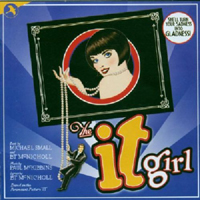 Original Off-Broadway Cast, 2002 (JAY)
Original Off-Broadway Cast, 2002 (JAY)  (3 / 5) Based on It, the 1927 film that starred Clara Bow, The It Girl is a small-scale, 1920s-style musical comedy. It was presented Off-Broadway by the York Theatre Company almost a year before the Broadway opening of Thoroughly Modern Millie, a show it resembles in some respects. Jean Louisa Kelly stars as Betty Lou Spence, a spitfire flapper-type who sets New York aflame with her unique brand of style and sexual appeal. The cast also includes Jonathan Dokuchitz as the object of her affection, Jessica Boevers as the object of his semi-affection, and Stephen DeRosa as the dandy who sets the frantic plot in motion. All of the performers are talented if not exactly bursting with charisma, and the songs provided by composer Paul McKibbins and lyricist B.T. McNicholl are drenched in ’20s rhythms and lively ragtime arrangements. The score’s standout is Boevers’ comic number “A Perfect Plan,” in which she details the peaks and valleys of her troubled love life. A tribute to “Coney Island” is bouncy and tuneful, “Why Not?” is a another cheerfully upbeat entry, and the almost title song “It” is catchy enough to get stuck in your head. — Matthew Murray
(3 / 5) Based on It, the 1927 film that starred Clara Bow, The It Girl is a small-scale, 1920s-style musical comedy. It was presented Off-Broadway by the York Theatre Company almost a year before the Broadway opening of Thoroughly Modern Millie, a show it resembles in some respects. Jean Louisa Kelly stars as Betty Lou Spence, a spitfire flapper-type who sets New York aflame with her unique brand of style and sexual appeal. The cast also includes Jonathan Dokuchitz as the object of her affection, Jessica Boevers as the object of his semi-affection, and Stephen DeRosa as the dandy who sets the frantic plot in motion. All of the performers are talented if not exactly bursting with charisma, and the songs provided by composer Paul McKibbins and lyricist B.T. McNicholl are drenched in ’20s rhythms and lively ragtime arrangements. The score’s standout is Boevers’ comic number “A Perfect Plan,” in which she details the peaks and valleys of her troubled love life. A tribute to “Coney Island” is bouncy and tuneful, “Why Not?” is a another cheerfully upbeat entry, and the almost title song “It” is catchy enough to get stuck in your head. — Matthew Murray
Is There Life After High School?
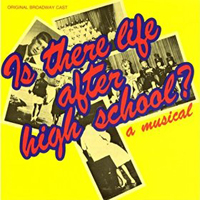 Original Broadway Cast, 1982 (Original Cast Records)
Original Broadway Cast, 1982 (Original Cast Records)  (5 / 5) If this show had opened Off-Broadway instead of on Broadway in 1982, it might have run a lot longer. Is There Life After High School? represents some of the best work of Craig Carnelia, an extraordinarily talented composer-lyricist who later wrote lyrics only to Marvin Hamlisch’s music for the score of Sweet Smell of Success. With a book by Jeffrey Kindley, the show is about the painful, wonderful experience of high school as viewed in retrospect by a group of young adults. The opening (and closing) number, “The Kid Inside,” is a highlight; the song offers spot-on observations about grown-ups who cling to their inner children, and the soaring musical phrase that’s sung to the words “There (s)he goes again” is a real ear worm. Among the show’s cleverest sequences is “Second Thoughts,” in which five people wonder what would have happened if they’d said or done things differently at pivotal moments in high school. Another standout is the beautiful song in which four women recall every detail of their earliest romantic encounters, even though “Nothing Really Happened.” Then there’s the hilarious ”I’m Glad You Didn’t Know Me” (in high school), sung by a couple to each other. (“Picture a phony / Doin’ the pony,” she sings; “Speaking of fears / I had an erection the whole four years,” he admits.) But the most precious gem of the score is probably “Fran and Janie,” a gorgeous tearjerker about two inseparable high school friends encountering each other years later. The estimable performers are Harry Groener, Maureen Silliman, Alma Cuervo, Sandy Faison, Raymond Baker, Cynthia Carle, David Patrick Kelly, Philip Hoffman, and James Widdoes. — Michael Portantiere
(5 / 5) If this show had opened Off-Broadway instead of on Broadway in 1982, it might have run a lot longer. Is There Life After High School? represents some of the best work of Craig Carnelia, an extraordinarily talented composer-lyricist who later wrote lyrics only to Marvin Hamlisch’s music for the score of Sweet Smell of Success. With a book by Jeffrey Kindley, the show is about the painful, wonderful experience of high school as viewed in retrospect by a group of young adults. The opening (and closing) number, “The Kid Inside,” is a highlight; the song offers spot-on observations about grown-ups who cling to their inner children, and the soaring musical phrase that’s sung to the words “There (s)he goes again” is a real ear worm. Among the show’s cleverest sequences is “Second Thoughts,” in which five people wonder what would have happened if they’d said or done things differently at pivotal moments in high school. Another standout is the beautiful song in which four women recall every detail of their earliest romantic encounters, even though “Nothing Really Happened.” Then there’s the hilarious ”I’m Glad You Didn’t Know Me” (in high school), sung by a couple to each other. (“Picture a phony / Doin’ the pony,” she sings; “Speaking of fears / I had an erection the whole four years,” he admits.) But the most precious gem of the score is probably “Fran and Janie,” a gorgeous tearjerker about two inseparable high school friends encountering each other years later. The estimable performers are Harry Groener, Maureen Silliman, Alma Cuervo, Sandy Faison, Raymond Baker, Cynthia Carle, David Patrick Kelly, Philip Hoffman, and James Widdoes. — Michael Portantiere
Irma La Douce
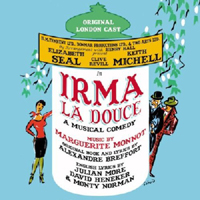 Original London Cast, 1958 (Philips/Sepiano CD)
Original London Cast, 1958 (Philips/Sepiano CD)  (4 / 5) This recording was not released in CD format until 2008. It will come as something of a revelation to those who only know Irma la Douce from the original Broadway cast recording. While the three London stars — Elizabeth Seal, Keith Michell, and Clive Revill — and director Peter Brook were all imported to Broadway, the London recording offers a great deal of dialogue that reveals the story with more clarity than on the subsequent Broadway cast album (see review below). Many of the lyrics are different, and there is a truly charming Act II reprise of “Our Language of Love,” in which Irma expresses her feelings about Nestor while he is in prison. In the ballet, we can hear the prison break, and we learn of Irma’s pregnancy and other plot details. The only disappointment is Seal’s delivery of the title song; she does a much better job on the Broadway recording. Other than that, the London LP captures the essence of a most unusual show, and the three leads are perhaps a little warmer and less slick here than they became by the time the show reached New York. — Jeffrey Dunn
(4 / 5) This recording was not released in CD format until 2008. It will come as something of a revelation to those who only know Irma la Douce from the original Broadway cast recording. While the three London stars — Elizabeth Seal, Keith Michell, and Clive Revill — and director Peter Brook were all imported to Broadway, the London recording offers a great deal of dialogue that reveals the story with more clarity than on the subsequent Broadway cast album (see review below). Many of the lyrics are different, and there is a truly charming Act II reprise of “Our Language of Love,” in which Irma expresses her feelings about Nestor while he is in prison. In the ballet, we can hear the prison break, and we learn of Irma’s pregnancy and other plot details. The only disappointment is Seal’s delivery of the title song; she does a much better job on the Broadway recording. Other than that, the London LP captures the essence of a most unusual show, and the three leads are perhaps a little warmer and less slick here than they became by the time the show reached New York. — Jeffrey Dunn
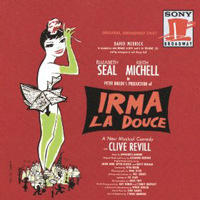 Original Broadway Cast, 1960 (Columbia/Sony)
Original Broadway Cast, 1960 (Columbia/Sony)  (4 / 5) One of very few French musicals to earn success in London and in New York, Irma la Douce went through some changes in each country, but this recording retains enough Gallic charm mixed with Broadway know-how to satisfy all but the most curmudgeonly of FrancophiIes. That’s particularly evident in the orchestrations of André Popp (additional orchestrations by Robert Ginzler, dance music by John Kander), with the obligatory accordion and a stylish xylophone often dominating. The overture is an old-fashioned attention-grabber. The opening number is “Valse Milieu,” in which Clive Revill as Bob-Ie-Hotu — who narrates the story and plays numerous other roles — sets up the plot and defines the French words that are sprinkled throughout the piece: poule for prostitute, mec for pimp, grisbi for money, and so on. The fanciful tale tells how one of Irma’s clients, Nestor, falls so in love with her that he wants to become her only client. The music is by Marguerite Monnot, composer of many songs popularized by Edith Piaf; the original French book and lyrics by Alexandre Breffort were cleverly adapted into English by Julian More, David Heneker, and Monty Norman. London leads Elizabeth Seal, Keith Michell, and Clive Revill also starred in the Broadway production. Seal, who won a Tony Award for her performance, is a singing actress whose personality jumps from a recording. Michell as Nestor has a beefy, full-bodied sound in the love duets, is comedic in “Wreck of a Mec,” and is magnificent in the haunting “From a Prison Cell.” Revill is especially funny in the climactic “But.” The all-male ensemble is excellent in “Sons of France,” “She’s Got the Lot,” and “Christmas Child.” There is also an extended sequence that ends up in an “Arctic Ballet” complete with penguins! It doesn’t make much sense, but the dance music is terrific. In his New York Herald Tribune review of Irma la Douce, Walter Kerr wrote: “If an original cast album is made available in your neighborhood, get it.” Take Mr. Kerr’s advice. — J.D.
(4 / 5) One of very few French musicals to earn success in London and in New York, Irma la Douce went through some changes in each country, but this recording retains enough Gallic charm mixed with Broadway know-how to satisfy all but the most curmudgeonly of FrancophiIes. That’s particularly evident in the orchestrations of André Popp (additional orchestrations by Robert Ginzler, dance music by John Kander), with the obligatory accordion and a stylish xylophone often dominating. The overture is an old-fashioned attention-grabber. The opening number is “Valse Milieu,” in which Clive Revill as Bob-Ie-Hotu — who narrates the story and plays numerous other roles — sets up the plot and defines the French words that are sprinkled throughout the piece: poule for prostitute, mec for pimp, grisbi for money, and so on. The fanciful tale tells how one of Irma’s clients, Nestor, falls so in love with her that he wants to become her only client. The music is by Marguerite Monnot, composer of many songs popularized by Edith Piaf; the original French book and lyrics by Alexandre Breffort were cleverly adapted into English by Julian More, David Heneker, and Monty Norman. London leads Elizabeth Seal, Keith Michell, and Clive Revill also starred in the Broadway production. Seal, who won a Tony Award for her performance, is a singing actress whose personality jumps from a recording. Michell as Nestor has a beefy, full-bodied sound in the love duets, is comedic in “Wreck of a Mec,” and is magnificent in the haunting “From a Prison Cell.” Revill is especially funny in the climactic “But.” The all-male ensemble is excellent in “Sons of France,” “She’s Got the Lot,” and “Christmas Child.” There is also an extended sequence that ends up in an “Arctic Ballet” complete with penguins! It doesn’t make much sense, but the dance music is terrific. In his New York Herald Tribune review of Irma la Douce, Walter Kerr wrote: “If an original cast album is made available in your neighborhood, get it.” Take Mr. Kerr’s advice. — J.D.
Irene
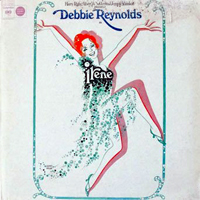 Broadway Cast, 1973 (Columbia/Sony)
Broadway Cast, 1973 (Columbia/Sony)  (4 / 5) Encouraged by the success of the 1971 Broadway revisal of No, No, Nannette, producer Harry Rigby and colleagues reworked and mounted Irene, a musical that had been a hit in 1919 but had hardly ever been performed since the 1930s — even though it included such Harry Tierney-Joseph McCarthy songs as the monster hit “Alice Blue Gown.” The buoyant headliner of the new Irene was Debbie Reynolds, who gave her pluckiest performance since the film version of The Unsinkable Molly Brown and helped turn the show into a hit. Happily, her gutsy portrayal is well preserved on the cast album. Reynolds’ rendition of “The World Must Be Bigger Than an Avenue,” a new song by Wally Harper, is dynamite. Other outstanding moments belong to George S. Irving in a Tony Award-winning performance as “Madame Lucy,” and Patsy Kelly, direct from her Tony-winning triumph in No, No, Nanette, as Irene’s mother. More star presence is provided by Monte Markham as Donald S. Marshall III and Ruth Warrick as his mother. The recording was artfully produced by the great Thomas Z. Shepard at the peak of his expertise. — Gerard Alessandrini
(4 / 5) Encouraged by the success of the 1971 Broadway revisal of No, No, Nannette, producer Harry Rigby and colleagues reworked and mounted Irene, a musical that had been a hit in 1919 but had hardly ever been performed since the 1930s — even though it included such Harry Tierney-Joseph McCarthy songs as the monster hit “Alice Blue Gown.” The buoyant headliner of the new Irene was Debbie Reynolds, who gave her pluckiest performance since the film version of The Unsinkable Molly Brown and helped turn the show into a hit. Happily, her gutsy portrayal is well preserved on the cast album. Reynolds’ rendition of “The World Must Be Bigger Than an Avenue,” a new song by Wally Harper, is dynamite. Other outstanding moments belong to George S. Irving in a Tony Award-winning performance as “Madame Lucy,” and Patsy Kelly, direct from her Tony-winning triumph in No, No, Nanette, as Irene’s mother. More star presence is provided by Monte Markham as Donald S. Marshall III and Ruth Warrick as his mother. The recording was artfully produced by the great Thomas Z. Shepard at the peak of his expertise. — Gerard Alessandrini
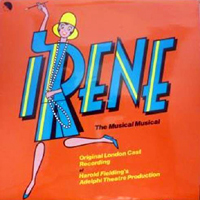 London Cast, 1976 (EMI/no CD)
London Cast, 1976 (EMI/no CD)  (4 / 5) This bouncy, well-performed London Irene stars the excellent Australian performer Julie Anthony. The arrangements and orchestrations are almost identical to those of the Broadway revisal, and they sound bright and crisp as recorded here. Under conductor Ralph Burns’ excellent baton, the chorus numbers are particularly spirited and exciting. As Irene, Anthony shows off a thrilling voice with much gusto, and she can belt out a show-stopper and then turn around and deliver a soft, tender ballad very effectively. The strong supporting cast includes Jon Pertwee, Jessie Evans, and Eric Flynn. As Donald, Flynn does an excellent job with a lovely old song that wasn’t in the Broadway production, “I Can Dream, Can’t I?” Another added treat is the ballad “If Only He Knew,” persuasively rendered by Anthony. This is an unusual London cast album in that the singers sound like authentic American musical theater performers, and the sound quality of the recording is superb. — G.A.
(4 / 5) This bouncy, well-performed London Irene stars the excellent Australian performer Julie Anthony. The arrangements and orchestrations are almost identical to those of the Broadway revisal, and they sound bright and crisp as recorded here. Under conductor Ralph Burns’ excellent baton, the chorus numbers are particularly spirited and exciting. As Irene, Anthony shows off a thrilling voice with much gusto, and she can belt out a show-stopper and then turn around and deliver a soft, tender ballad very effectively. The strong supporting cast includes Jon Pertwee, Jessie Evans, and Eric Flynn. As Donald, Flynn does an excellent job with a lovely old song that wasn’t in the Broadway production, “I Can Dream, Can’t I?” Another added treat is the ballad “If Only He Knew,” persuasively rendered by Anthony. This is an unusual London cast album in that the singers sound like authentic American musical theater performers, and the sound quality of the recording is superb. — G.A.
I Remember Mama
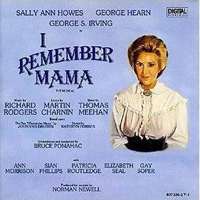 Studio Cast, 1985 (Polygram)
Studio Cast, 1985 (Polygram)  (3 / 5) Richard Rodgers’ musical imagination persisted throughout his life, despite depression, a heart attack, and cancer of the vocal cords. His final show opened just seven months before he died. It was a musical version of I Remember Mama, a play written by John Van Druten and adapted from Mama’s Bank Account, a collection of stories by Kathryn Forbes. The play had also inspired a movie and a television series.) In all its incarnations, the story is about a Norwegian family living in San Francisco around 1910. But, foremost, it’s about Mama, a woman of little education who has a naturally liberal turn of mind. Rodgers wrote the musical with librettist Thomas Meehan and lyricist-director Martin Charnin. Film actress Liv Ullmann, who was not a gifted singer, played the title role. During the out-of-town tryout, producers Alexander Cohen and Hildy Parks brought in a new director, Cy Feuer, and a new lyricist, Raymond Jessel. Amid the chaos of the pre-Broadway tour, Rodgers created six new songs in two weeks. The show opened on Broadway in May 1979 to largely disparaging reviews and closed three months later. Still, Mama proves that even a lower-tier work by Rodgers is superior to almost anyone else’s best effort, and in songs such as “You Could Not Please Me More” and “Time,” the music soars above the pedestrian lyrics. No cast album of the show was made; this studio recording was produced by Norman Newell, with John Yap as executive producer and Theodore S. Chapin as coordinating producer. Parts of it were recorded on either side of the Atlantic to accommodate a dream cast of American and British performers. George Hearn as Papa and George S. Irving as Uncle Chris recreate their Broadway roles; Sally Ann Howes replaces Ullmann as Mama; Ann Morrison plays Katrin, the writer who immortalizes Mama in magazine fiction; Gay Soper is Mama’s benevolent sister; Patricia Routledge is Aunt Jenny; Elizabeth Seal is Aunt Sigrid; and Sian Phillips appears as a British novelist. In the lively “Easy Come, Easy Go” and the acidic “It’s Going to Be Good to Be Gone,” Irving shows off the stuff that made him one of the theater’s great comedic assets. The recording’s high point is the Routledge-Seal duet “A Most Disagreeable Man.” — Charles Wright
(3 / 5) Richard Rodgers’ musical imagination persisted throughout his life, despite depression, a heart attack, and cancer of the vocal cords. His final show opened just seven months before he died. It was a musical version of I Remember Mama, a play written by John Van Druten and adapted from Mama’s Bank Account, a collection of stories by Kathryn Forbes. The play had also inspired a movie and a television series.) In all its incarnations, the story is about a Norwegian family living in San Francisco around 1910. But, foremost, it’s about Mama, a woman of little education who has a naturally liberal turn of mind. Rodgers wrote the musical with librettist Thomas Meehan and lyricist-director Martin Charnin. Film actress Liv Ullmann, who was not a gifted singer, played the title role. During the out-of-town tryout, producers Alexander Cohen and Hildy Parks brought in a new director, Cy Feuer, and a new lyricist, Raymond Jessel. Amid the chaos of the pre-Broadway tour, Rodgers created six new songs in two weeks. The show opened on Broadway in May 1979 to largely disparaging reviews and closed three months later. Still, Mama proves that even a lower-tier work by Rodgers is superior to almost anyone else’s best effort, and in songs such as “You Could Not Please Me More” and “Time,” the music soars above the pedestrian lyrics. No cast album of the show was made; this studio recording was produced by Norman Newell, with John Yap as executive producer and Theodore S. Chapin as coordinating producer. Parts of it were recorded on either side of the Atlantic to accommodate a dream cast of American and British performers. George Hearn as Papa and George S. Irving as Uncle Chris recreate their Broadway roles; Sally Ann Howes replaces Ullmann as Mama; Ann Morrison plays Katrin, the writer who immortalizes Mama in magazine fiction; Gay Soper is Mama’s benevolent sister; Patricia Routledge is Aunt Jenny; Elizabeth Seal is Aunt Sigrid; and Sian Phillips appears as a British novelist. In the lively “Easy Come, Easy Go” and the acidic “It’s Going to Be Good to Be Gone,” Irving shows off the stuff that made him one of the theater’s great comedic assets. The recording’s high point is the Routledge-Seal duet “A Most Disagreeable Man.” — Charles Wright
In Trousers
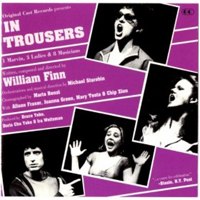 Original Off-Broadway Cast, 1979 (Original Cast Records)
Original Off-Broadway Cast, 1979 (Original Cast Records)  (5 / 5) Long before the William Finn character known simply as Marvin experienced joy and pain in March of the Falsettos, Falsettoland, or the amalgam known and celebrated as Falsettos, he was introduced in this 1979 work. The show never achieved the prominence of Finn’s other “Marvin Musicals,” but it’s by far the most tuneful. Finn’s lyrics here are sometimes tough to understand; the opening song, “Marvin’s Giddy Seizures,” suggests that In Trousers will be about an epileptic rather than a bisexual who’s leaving his wife for a man (Whizzer, who never appears in the show, although he’s frequently referenced). But, oh, what a glorious set of Finn melodies! “High School Ladies at Five O’Clock” is an infectious number that will have you playing it over again and again. “Whizzer Going Down” might be described as an Americanized version of Edith Piaf’s irresistible “Milord,” and what could be a higher compliment than that? “How Marvin Eats His Breakfast” doesn’t just have a memorable melody, but also a fascinating lyric: We get a young child’s point of view in wanting to eat right now. In this song and others, Chip Zien as Mavin is sensational in his first major role. — Peter Filichia
(5 / 5) Long before the William Finn character known simply as Marvin experienced joy and pain in March of the Falsettos, Falsettoland, or the amalgam known and celebrated as Falsettos, he was introduced in this 1979 work. The show never achieved the prominence of Finn’s other “Marvin Musicals,” but it’s by far the most tuneful. Finn’s lyrics here are sometimes tough to understand; the opening song, “Marvin’s Giddy Seizures,” suggests that In Trousers will be about an epileptic rather than a bisexual who’s leaving his wife for a man (Whizzer, who never appears in the show, although he’s frequently referenced). But, oh, what a glorious set of Finn melodies! “High School Ladies at Five O’Clock” is an infectious number that will have you playing it over again and again. “Whizzer Going Down” might be described as an Americanized version of Edith Piaf’s irresistible “Milord,” and what could be a higher compliment than that? “How Marvin Eats His Breakfast” doesn’t just have a memorable melody, but also a fascinating lyric: We get a young child’s point of view in wanting to eat right now. In this song and others, Chip Zien as Mavin is sensational in his first major role. — Peter Filichia
Into the Woods
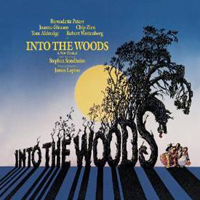 Original Broadway Cast, 1987 (RCA)
Original Broadway Cast, 1987 (RCA)  (3 / 5) One of Stephen Sondheim’s most commercially successful shows, Into the Woods has one of his least distinctive scores. Perhaps he wasn’t really inspired by the fairy tale setting or the characters, most of them lifted from famous stories, or perhaps he and librettist-director James Lapine thought that making the characters self-aware and having them face the realities of “happily ever after” was enough? Aside from an interesting song or two — “No One Is Alone,” “Children Will Listen” — there’s not a lot of “here” here. Considering the setting, the tunes aren’t particularly magical, and some of the lyrics (“There’s no time to sit and dither / While her withers wither with her”) are forced in their cleverness. But the recording showcases some top-notch performers: Bernadette Peters milks the role of the worldly wise witch for all it’s worth; Joanna Gleason brings a thrilling vibe to the part of the Baker’s Wife; and Chip Zien is a neurotic joy as the Baker himself. Tom Aldredge as the narrator, Kim Crosby as Cinderella, Ben Wright as Jack, Danielle Ferland as Little Red Riding Hood, and Kay McClelland and Lauren Mitchell as Cinderella’s bitchy stepsisters are also great. The video of the original Broadway production is a better representation of Into the Woods, but if you can’t find it, this recording will do. — Matthew Murray
(3 / 5) One of Stephen Sondheim’s most commercially successful shows, Into the Woods has one of his least distinctive scores. Perhaps he wasn’t really inspired by the fairy tale setting or the characters, most of them lifted from famous stories, or perhaps he and librettist-director James Lapine thought that making the characters self-aware and having them face the realities of “happily ever after” was enough? Aside from an interesting song or two — “No One Is Alone,” “Children Will Listen” — there’s not a lot of “here” here. Considering the setting, the tunes aren’t particularly magical, and some of the lyrics (“There’s no time to sit and dither / While her withers wither with her”) are forced in their cleverness. But the recording showcases some top-notch performers: Bernadette Peters milks the role of the worldly wise witch for all it’s worth; Joanna Gleason brings a thrilling vibe to the part of the Baker’s Wife; and Chip Zien is a neurotic joy as the Baker himself. Tom Aldredge as the narrator, Kim Crosby as Cinderella, Ben Wright as Jack, Danielle Ferland as Little Red Riding Hood, and Kay McClelland and Lauren Mitchell as Cinderella’s bitchy stepsisters are also great. The video of the original Broadway production is a better representation of Into the Woods, but if you can’t find it, this recording will do. — Matthew Murray
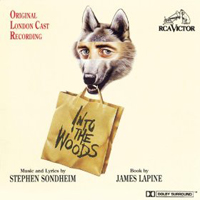 Original London Cast, 1991 (RCA)
Original London Cast, 1991 (RCA)  (2 / 5) This is a nice complement to the original Broadway album, but in no way equal to it. With the exception of Julia McKenzie’s fiercely acted and sung Witch, there’s a stodginess exhibited by many of the leads; Ian Bartholomew and Imelda Staunton lack the distinctive personalities that Zien and Gleason brought to the roles of the Baker and his Wife, and other cast members are similarly challenged by the material. A new song here for the Witch and Rapunzel, “Our Little World,” is musically attractive, but it spoils the original show’s joke about Rapunzel never singing real lyrics, and it doesn’t further the relationship between the two characters. — M.M.
(2 / 5) This is a nice complement to the original Broadway album, but in no way equal to it. With the exception of Julia McKenzie’s fiercely acted and sung Witch, there’s a stodginess exhibited by many of the leads; Ian Bartholomew and Imelda Staunton lack the distinctive personalities that Zien and Gleason brought to the roles of the Baker and his Wife, and other cast members are similarly challenged by the material. A new song here for the Witch and Rapunzel, “Our Little World,” is musically attractive, but it spoils the original show’s joke about Rapunzel never singing real lyrics, and it doesn’t further the relationship between the two characters. — M.M.
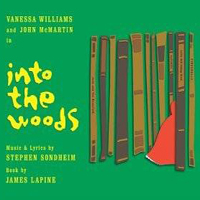 Broadway Cast, 2002 (Nonesuch)
Broadway Cast, 2002 (Nonesuch)  (1 / 5) Almost none of the charm of the original production of Into the Woods survived in the misbegotten revival that yielded this recording. With the exception of Laura Benanti, who brings a purity to Cinderella, these performers are weak. Stephen DeRosa and Kerry O’Malley as the Baker and his Wife are personality-free, and Marylouise Burke massacres much of Jack’s Mother’s music. Vanessa Williams is the dullest Witch imaginable; her singing is adequate at best and grating at worst. Other liabilities include the thinned-down sound of Jonathan Tunick’s orchestrations and the relentless tinkering with the script and score. Some of the changes are unnecessary — for example, the insertion of “Our Little World” and the addition of a second wolf and three pigs to “Hello, Little Girl.” Others are bizarre and damaging, such as having Jack and Little Red chime in on what used to be Cinderella’s big solo, “On the Steps of the Palace.” — M.M.
(1 / 5) Almost none of the charm of the original production of Into the Woods survived in the misbegotten revival that yielded this recording. With the exception of Laura Benanti, who brings a purity to Cinderella, these performers are weak. Stephen DeRosa and Kerry O’Malley as the Baker and his Wife are personality-free, and Marylouise Burke massacres much of Jack’s Mother’s music. Vanessa Williams is the dullest Witch imaginable; her singing is adequate at best and grating at worst. Other liabilities include the thinned-down sound of Jonathan Tunick’s orchestrations and the relentless tinkering with the script and score. Some of the changes are unnecessary — for example, the insertion of “Our Little World” and the addition of a second wolf and three pigs to “Hello, Little Girl.” Others are bizarre and damaging, such as having Jack and Little Red chime in on what used to be Cinderella’s big solo, “On the Steps of the Palace.” — M.M.
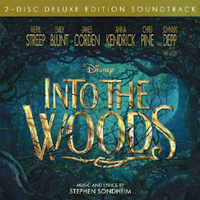 Film Soundtrack, 2014 (Walt Disney)
Film Soundtrack, 2014 (Walt Disney)  (3 / 5) For Sondheim die-hards, no production of Into the Woods ever will, ever could surpass the first, with its robust, indelible performances captured forever on audio as well as video. But the 2014 film version is surprisingly strong, due in no small part to the high quality of its Hollywood-minded casting, and the soundtrack captures this rendition’s strengths while obscuring its flaws. Meryl Streep makes a zesty Witch, singing with conviction (if not always beauty) and playing well opposite the Baker (James Corden at his Everyman best) and his wife (Emily Blunt, in a particularly intelligent performance). Anna Kendrick brings a palpable spunk to her thoughtful Cinderella. As the Princes, Chris Pine and (especially) Billy Magnussen capture the right notes of stuffed-shirt self-indulgence, and the luxurious casting of Tracey Ullman and Christine Baranski as Jack’s Mother and Cinderella’s Stepmother ensure that these roles don’t get short shrift in terms of comedy. There’s definitely room to quibble: The changes to the original material, including the cutting of a few songs, don’t really serve the property well; Johnny Depp is too weird to be threatening as the Wolf; and while Lilla Crawford as Little Red Riding Hood and Daniel Huttlestone as Jack do well by their songs, they’re too young and unseasoned to give their characters the complexities they need. But combine all that does work with a gorgeous-sounding orchestra (playing expanded versions of Jonathan Tunick’s orchestrations under original conductor Paul Gemignani), and the result is a better stage-to-screen translation than all but the most fervent Sondheim acolytes had any right to hope for. — M.M.
(3 / 5) For Sondheim die-hards, no production of Into the Woods ever will, ever could surpass the first, with its robust, indelible performances captured forever on audio as well as video. But the 2014 film version is surprisingly strong, due in no small part to the high quality of its Hollywood-minded casting, and the soundtrack captures this rendition’s strengths while obscuring its flaws. Meryl Streep makes a zesty Witch, singing with conviction (if not always beauty) and playing well opposite the Baker (James Corden at his Everyman best) and his wife (Emily Blunt, in a particularly intelligent performance). Anna Kendrick brings a palpable spunk to her thoughtful Cinderella. As the Princes, Chris Pine and (especially) Billy Magnussen capture the right notes of stuffed-shirt self-indulgence, and the luxurious casting of Tracey Ullman and Christine Baranski as Jack’s Mother and Cinderella’s Stepmother ensure that these roles don’t get short shrift in terms of comedy. There’s definitely room to quibble: The changes to the original material, including the cutting of a few songs, don’t really serve the property well; Johnny Depp is too weird to be threatening as the Wolf; and while Lilla Crawford as Little Red Riding Hood and Daniel Huttlestone as Jack do well by their songs, they’re too young and unseasoned to give their characters the complexities they need. But combine all that does work with a gorgeous-sounding orchestra (playing expanded versions of Jonathan Tunick’s orchestrations under original conductor Paul Gemignani), and the result is a better stage-to-screen translation than all but the most fervent Sondheim acolytes had any right to hope for. — M.M.
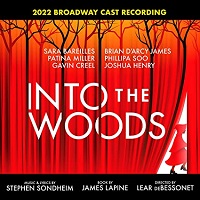 Broadway Cast, 2022 (Craft Recordings)
Broadway Cast, 2022 (Craft Recordings)  (3 / 5) Here we have an Into the Woods that went back to the basics. Director Lear deBessonet’s acclaimed revival took an approach counter to that of the several productions over the years that have clouded the musical’s virtues with outlandish designs, misguided concepts, and detrimental rewrites. Instead, deBessonet and her ensemble simply presented the show as it was originally written, and the approach was most welcome. That isn’t to say that the resulting cast album is perfect, or even the best one that exists. While this is perhaps the best sung Woods on record, and the crisp, balanced audio gives us the best capture of Jonathan Tunick’s original orchestrations to date, there are still some flaws, including a rather lackadaisical energy to the lovely-sounding performances. Sara Bareilles is the most endearing Baker’s Wife since Joanna Gleason, and her smooth alto fits Sondheim’s score perfectly, but she and Brian d’Arcy James’s Baker often come across as laid back rather than motivated and driven. Similarly, Patina Miller’s Witch is a bit too restrained and controlled to give “Stay with Me” the bleeding heart or “Last Midnight” the wild thrills that Bernadette Peters so memorably brought to these songs. Most of the rest of the cast is similarly rich vocally but casual dramatically. One exception, though not in a good way, is Julia Lester’s Little Red; while a standout on stage, Lester did not scale down her performance for the recording medium, and so she comes off as overly brash in the part. Still, because of the quality of the voices, one will likely find much to enjoy in listening to Bareilles’ “Moments in the Woods,” Phillipa Soo as Cinderella in “No One Is Alone,” and “Agony” with an entertaining Gavin Creel (Cinderella’s Prince) and Joshua Henry (Rapunzel’s Prince). It may just be that no cast album of Into the Woods will ever be able to fully capture what makes the show special, but a strong recording of the material with no intrusive embellishments is a pleasure to hear. — Matt Koplik
(3 / 5) Here we have an Into the Woods that went back to the basics. Director Lear deBessonet’s acclaimed revival took an approach counter to that of the several productions over the years that have clouded the musical’s virtues with outlandish designs, misguided concepts, and detrimental rewrites. Instead, deBessonet and her ensemble simply presented the show as it was originally written, and the approach was most welcome. That isn’t to say that the resulting cast album is perfect, or even the best one that exists. While this is perhaps the best sung Woods on record, and the crisp, balanced audio gives us the best capture of Jonathan Tunick’s original orchestrations to date, there are still some flaws, including a rather lackadaisical energy to the lovely-sounding performances. Sara Bareilles is the most endearing Baker’s Wife since Joanna Gleason, and her smooth alto fits Sondheim’s score perfectly, but she and Brian d’Arcy James’s Baker often come across as laid back rather than motivated and driven. Similarly, Patina Miller’s Witch is a bit too restrained and controlled to give “Stay with Me” the bleeding heart or “Last Midnight” the wild thrills that Bernadette Peters so memorably brought to these songs. Most of the rest of the cast is similarly rich vocally but casual dramatically. One exception, though not in a good way, is Julia Lester’s Little Red; while a standout on stage, Lester did not scale down her performance for the recording medium, and so she comes off as overly brash in the part. Still, because of the quality of the voices, one will likely find much to enjoy in listening to Bareilles’ “Moments in the Woods,” Phillipa Soo as Cinderella in “No One Is Alone,” and “Agony” with an entertaining Gavin Creel (Cinderella’s Prince) and Joshua Henry (Rapunzel’s Prince). It may just be that no cast album of Into the Woods will ever be able to fully capture what makes the show special, but a strong recording of the material with no intrusive embellishments is a pleasure to hear. — Matt Koplik
Inside U.S.A.
 Original Cast Members, 1948 (SHB-Show-Biz Productions/Sepia)
Original Cast Members, 1948 (SHB-Show-Biz Productions/Sepia)  (3 / 5) Almost forgotten today but the second-longest-running revue of 1948, this Howard Dietz-Arthur Schwartz opus inspired by John Gunther’s best-seller had a starry cast, yielded two minor hit ballads (“Haunted Heart” and “Rhode Island Is Famous for You”), and displayed some of the old ingenuity that peppered the team’s 1930s revue output. The reconstituted cast album, assembled from scratchy 78s and topping out at 28 minutes, boasts no rediscovered gems but shows off its cast ably; and the opening title number, with a lobotomized-sounding chorus exuding “The USA is gay, uproarious / In a glorious way,” fully evokes mid-century nationalism. Pearl Bailey exudes her patented lazy hauteur in “Protect Me” and “Blue Grass,” while Jack Haley puts over all of the playful “Rhode Island” puns (“Pencils come from Pennsylvania / Vests from Vest Virginia / And tents from Tentassee”). Beatrice Lillie plays a happy convict in “Atlanta,” a deranged choral director in “Come, O Come,” and a jolly reveler in “Mardi Gras.” Billy Williams, not of the original company, somehow landed on the album; he delivers an undistinguished cowboy ballad. The cast of the show also included Jack Cassidy in the chorus and Carl Reiner delivering monologues but, alas, you won’t hear them here. [Note: The Sepia CD release also includes selections from The Band Wagon with Fred and Adele Astaire.] — Marc Miller
(3 / 5) Almost forgotten today but the second-longest-running revue of 1948, this Howard Dietz-Arthur Schwartz opus inspired by John Gunther’s best-seller had a starry cast, yielded two minor hit ballads (“Haunted Heart” and “Rhode Island Is Famous for You”), and displayed some of the old ingenuity that peppered the team’s 1930s revue output. The reconstituted cast album, assembled from scratchy 78s and topping out at 28 minutes, boasts no rediscovered gems but shows off its cast ably; and the opening title number, with a lobotomized-sounding chorus exuding “The USA is gay, uproarious / In a glorious way,” fully evokes mid-century nationalism. Pearl Bailey exudes her patented lazy hauteur in “Protect Me” and “Blue Grass,” while Jack Haley puts over all of the playful “Rhode Island” puns (“Pencils come from Pennsylvania / Vests from Vest Virginia / And tents from Tentassee”). Beatrice Lillie plays a happy convict in “Atlanta,” a deranged choral director in “Come, O Come,” and a jolly reveler in “Mardi Gras.” Billy Williams, not of the original company, somehow landed on the album; he delivers an undistinguished cowboy ballad. The cast of the show also included Jack Cassidy in the chorus and Carl Reiner delivering monologues but, alas, you won’t hear them here. [Note: The Sepia CD release also includes selections from The Band Wagon with Fred and Adele Astaire.] — Marc Miller
I’m Getting My Act Together and Taking It on the Road
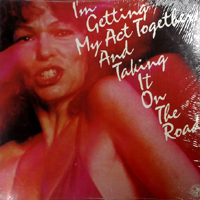 Original Off-Broadway Cast, 1978 (Columbia/Fynsworth Alley/Masterworks Broadway)
Original Off-Broadway Cast, 1978 (Columbia/Fynsworth Alley/Masterworks Broadway)  (3 / 5) The book and lyrics are by Gretchen Cryer, who also plays the lead character, Heather. The music is by Nancy Ford. These two had teamed previously on unsuccessful shows, but I’m Getting My Act Together and Taking It on the Road finally put them on the map. Heather, well played and sung by Cryer, is a soap opera star who’s rehearsing for the opening of her cabaret act. All the songs are presented as part of the rehearsal, which is attended by Heather’s manager and old friend, Joe (a non-singing role). Heather and her two female backup singers do all the vocalizing, with an occasional assist from a band member. The year was 1978, when many women were working toward self-actualization; so the songs, all ostensibly written by Heather, are autobiographical, and Joe has issues with them. The song titles suggest their contents: “Miss America,” “Strong Woman Number,” “Smile (for Daddy),” “Lonely Lady,” and “Old Friend,” now a cabaret classic. Cryer’s terrific backup ladies are Betty Aberlin and Margot Rose. The band includes Don Scardino as the young guitarist Jake, who sweetly sings “In a Simple Way, I Love You.” The 11 songs (plus one reprise) are all in a late-1970s pop vein and are given no theatrical context on the recording, which is an easy listen but not a theatrically engaging one. — Jeffrey Dunn
(3 / 5) The book and lyrics are by Gretchen Cryer, who also plays the lead character, Heather. The music is by Nancy Ford. These two had teamed previously on unsuccessful shows, but I’m Getting My Act Together and Taking It on the Road finally put them on the map. Heather, well played and sung by Cryer, is a soap opera star who’s rehearsing for the opening of her cabaret act. All the songs are presented as part of the rehearsal, which is attended by Heather’s manager and old friend, Joe (a non-singing role). Heather and her two female backup singers do all the vocalizing, with an occasional assist from a band member. The year was 1978, when many women were working toward self-actualization; so the songs, all ostensibly written by Heather, are autobiographical, and Joe has issues with them. The song titles suggest their contents: “Miss America,” “Strong Woman Number,” “Smile (for Daddy),” “Lonely Lady,” and “Old Friend,” now a cabaret classic. Cryer’s terrific backup ladies are Betty Aberlin and Margot Rose. The band includes Don Scardino as the young guitarist Jake, who sweetly sings “In a Simple Way, I Love You.” The 11 songs (plus one reprise) are all in a late-1970s pop vein and are given no theatrical context on the recording, which is an easy listen but not a theatrically engaging one. — Jeffrey Dunn
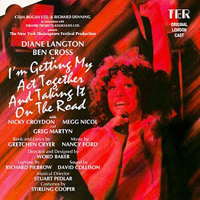 Original London Cast, 1981 (JAY)
Original London Cast, 1981 (JAY)  (4 / 5) This recording tries to impart a feeling of the entire show. Much dialogue is included, and the non-singing character Joe is an essential part of the proceedings. The song list is augmented by a version of “In a Simple Way, I Love You” for Heather and a fun throwaway number for Jake, “If Only Things Was Different.” Diane Langton is Heather, and Ben Cross is Joe. Langton’s singing is solid throughout; she belts “Happy Birthday” and “Natural High” with conviction, and is remarkably touching in “Old Friend” and “Dear Tom” (about Heather’s ex-husband). Throughout the recording, she receives strong vocal support from Nicky Croydon and Megg Nicol. Gregg Martyn sings attractively as Jake, who flirts with Heather but is rejected because she finds him too young. (To get this plot point from the Off-Broadway cast album, you must read the synopsis.) All the songs are very well set up by the dialogue, and therefore seem to have more of an emotional center here than they do on the the previous recording. Having Cross as Joe fully participate in the recorded action gives Heather an obstacle to play against, so the listener is aware of what is at stake within each number. The argument over how much dialogue, if any, should be included on cast albums is endless, but comparison of this recording with the one reviewed above demonstrates how a show’s songs come across with greater strength on a recording when put in their dramatic context. — J.D.
(4 / 5) This recording tries to impart a feeling of the entire show. Much dialogue is included, and the non-singing character Joe is an essential part of the proceedings. The song list is augmented by a version of “In a Simple Way, I Love You” for Heather and a fun throwaway number for Jake, “If Only Things Was Different.” Diane Langton is Heather, and Ben Cross is Joe. Langton’s singing is solid throughout; she belts “Happy Birthday” and “Natural High” with conviction, and is remarkably touching in “Old Friend” and “Dear Tom” (about Heather’s ex-husband). Throughout the recording, she receives strong vocal support from Nicky Croydon and Megg Nicol. Gregg Martyn sings attractively as Jake, who flirts with Heather but is rejected because she finds him too young. (To get this plot point from the Off-Broadway cast album, you must read the synopsis.) All the songs are very well set up by the dialogue, and therefore seem to have more of an emotional center here than they do on the the previous recording. Having Cross as Joe fully participate in the recorded action gives Heather an obstacle to play against, so the listener is aware of what is at stake within each number. The argument over how much dialogue, if any, should be included on cast albums is endless, but comparison of this recording with the one reviewed above demonstrates how a show’s songs come across with greater strength on a recording when put in their dramatic context. — J.D.
I Love You, You’re Perfect, Now Change
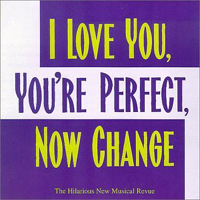 Off-Broadway Cast, 1996 (Varèse Sarabande)
Off-Broadway Cast, 1996 (Varèse Sarabande)  (4 / 5) “Oh my God, that’s me up there!” was an audience whisper heard often during the long run of this musical revue, the winning work of Joe DiPietro (lyrics) and Jimmy Roberts (music). Unapologetically middlebrow and critic-proof, the show is not the wittiest or most profound examination of male-female relationships ever written, but it’s a parade of good revue ideas smartly developed: nerds on a date, macho posturing, the shortage of straight, single men, baby-talking parents, geriatric romance, and more. Roberts relies on pastiche — some Lite-FM rock here, a sweet ballad there — and the music supports rather than overwhelms the lyrics. DiPietro rhymes a bit lazily and sometimes stumbles to weak endings, but the general tenor of the songs is likeable. All of the cast members sing well and slip effortlessly in and out of varied characterizations: Danny Burstein as an alpha male blubbering through a chick flick; Jennifer Simard as a mousy date; Melissa Weil bemoaning a bridesmaid’s plight (“For Tabitha, I wore taffeta / You never should, people laugh at ya”); and Robert Roznowski in the generic but affecting “Shouldn’t I Be Less in Love With You?” Roberts did his own vocal and instrumental arrangements, which are as modest and to-the-point as the show itself. — Marc Miller
(4 / 5) “Oh my God, that’s me up there!” was an audience whisper heard often during the long run of this musical revue, the winning work of Joe DiPietro (lyrics) and Jimmy Roberts (music). Unapologetically middlebrow and critic-proof, the show is not the wittiest or most profound examination of male-female relationships ever written, but it’s a parade of good revue ideas smartly developed: nerds on a date, macho posturing, the shortage of straight, single men, baby-talking parents, geriatric romance, and more. Roberts relies on pastiche — some Lite-FM rock here, a sweet ballad there — and the music supports rather than overwhelms the lyrics. DiPietro rhymes a bit lazily and sometimes stumbles to weak endings, but the general tenor of the songs is likeable. All of the cast members sing well and slip effortlessly in and out of varied characterizations: Danny Burstein as an alpha male blubbering through a chick flick; Jennifer Simard as a mousy date; Melissa Weil bemoaning a bridesmaid’s plight (“For Tabitha, I wore taffeta / You never should, people laugh at ya”); and Robert Roznowski in the generic but affecting “Shouldn’t I Be Less in Love With You?” Roberts did his own vocal and instrumental arrangements, which are as modest and to-the-point as the show itself. — Marc Miller
I Love My Wife
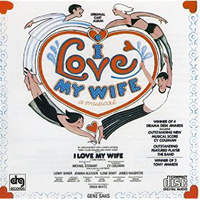 Original Broadway Cast, 1977 (Atlantic/DRG)
Original Broadway Cast, 1977 (Atlantic/DRG)  (2 / 5) “Wife-swapping” was already a dated topic in 1977, but this miniature musical sex farce was the surprise hit of the season. Audiences were taken with the zippy score by Cy Coleman and Michael Stewart (the latter also wrote the book), and by Gene Saks’ clever staging, which featured four onstage musicians commenting on the action involving two inept pairs of married swingers in Trenton, NJ. The show launched the career of comic actor Lenny Baker, who sadly died a few years later before attaining real stardom. From a 21st century vantage point, many of the songs — with their coy sex jokes and titles like “Love Revolution,” “Sexually Free,” “Ev’rybody Today Is Turning On,” and “Married Couple Seeks Married Couple” — come across as so many outtakes from a PG-13 version of Oh! Calcutta! But Coleman is, as always, a true pro, and Stewart’s lyrics are generally nimble and literate. A few numbers are first-class, including the wistful country ballad “Someone Wonderful I Missed” and the touching title tune. The second-act opener, “Hey There, Good Times,” is classic Coleman — an irresistible ragtime stomp — with delicious Stewart lyrics, though it has virtually nothing to do with the plot of the show. The cast, including the young Joanna Gleason, James Naughton, and Ilene Graff, is fine. — David Barbour
(2 / 5) “Wife-swapping” was already a dated topic in 1977, but this miniature musical sex farce was the surprise hit of the season. Audiences were taken with the zippy score by Cy Coleman and Michael Stewart (the latter also wrote the book), and by Gene Saks’ clever staging, which featured four onstage musicians commenting on the action involving two inept pairs of married swingers in Trenton, NJ. The show launched the career of comic actor Lenny Baker, who sadly died a few years later before attaining real stardom. From a 21st century vantage point, many of the songs — with their coy sex jokes and titles like “Love Revolution,” “Sexually Free,” “Ev’rybody Today Is Turning On,” and “Married Couple Seeks Married Couple” — come across as so many outtakes from a PG-13 version of Oh! Calcutta! But Coleman is, as always, a true pro, and Stewart’s lyrics are generally nimble and literate. A few numbers are first-class, including the wistful country ballad “Someone Wonderful I Missed” and the touching title tune. The second-act opener, “Hey There, Good Times,” is classic Coleman — an irresistible ragtime stomp — with delicious Stewart lyrics, though it has virtually nothing to do with the plot of the show. The cast, including the young Joanna Gleason, James Naughton, and Ilene Graff, is fine. — David Barbour
Illya Darling
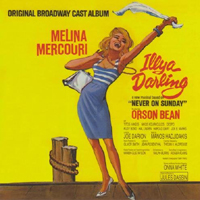 Original Broadway Cast, 1967 (United Artists/Kritzerland) No stars; not recommended. Having had an art-house film hit with Never on Sunday, writer-director Jules Dassin and the Mrs., otherwise known as Melina Mercouri, teamed up again for the stage musical version, which ran more than 300 performances before pretty much vanishing from Broadway’s collective memory. The cast album was very belatedly transferred to CD (in 2008), and even then was only made available in a limited edition. Once again, Mercouri is Illya, the happiest prostitute on the island of Piraeus. This time, Orson Bean is Homer, the dopey American intellectual who wants to introduce her to culture and the finer things in life. The score, with music by Manos Hadjidakis (who did the film) and lyrics by Joe Darion, is heavy with bouzoukis (Ralph Burns orchestrated) and lusty, life-affirming numbers. The only song that stands out is “Never on Sunday” — which, of course, comes from the movie. Mercouri’s smoky voice and sexy intonations are fun to hear, but Bean’s numbers, “Golden Land” and “I Think She Needs Me,” are pretty dire. And “Medea Tango,” which tries to replicate one of the funniest moments in the film (when Illya explains Greek tragedy to Homer), falls flat. The actress Despo, playing a character named Despo, sings “I’Il Never Lay Down Anymore,” a title that tells all. There are also silly local-color items such as “Heaven Help the Sailors on a Night Like This.” — David Barbour
Original Broadway Cast, 1967 (United Artists/Kritzerland) No stars; not recommended. Having had an art-house film hit with Never on Sunday, writer-director Jules Dassin and the Mrs., otherwise known as Melina Mercouri, teamed up again for the stage musical version, which ran more than 300 performances before pretty much vanishing from Broadway’s collective memory. The cast album was very belatedly transferred to CD (in 2008), and even then was only made available in a limited edition. Once again, Mercouri is Illya, the happiest prostitute on the island of Piraeus. This time, Orson Bean is Homer, the dopey American intellectual who wants to introduce her to culture and the finer things in life. The score, with music by Manos Hadjidakis (who did the film) and lyrics by Joe Darion, is heavy with bouzoukis (Ralph Burns orchestrated) and lusty, life-affirming numbers. The only song that stands out is “Never on Sunday” — which, of course, comes from the movie. Mercouri’s smoky voice and sexy intonations are fun to hear, but Bean’s numbers, “Golden Land” and “I Think She Needs Me,” are pretty dire. And “Medea Tango,” which tries to replicate one of the funniest moments in the film (when Illya explains Greek tragedy to Homer), falls flat. The actress Despo, playing a character named Despo, sings “I’Il Never Lay Down Anymore,” a title that tells all. There are also silly local-color items such as “Heaven Help the Sailors on a Night Like This.” — David Barbour
If Love Were All
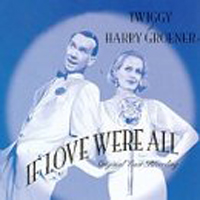 Original Off-Broadway Cast, 1999 (Varèse Sarabande)
Original Off-Broadway Cast, 1999 (Varèse Sarabande)  (4 / 5) In an introductory note, this diversion’s creator Sheridan Morley recalls that Noël Coward and Gertrude Lawrence acted together only twice, in Private Lives and Tonight at 8:30. At that, their performances in those vehicles were in limited runs in London and New York. Yet the two were in love with each other from their first meeting, when he was 13, she was 14, and they were leaving town for a tour; the word “platonic” hardly begins to explain their devotion. In Morley’s soigné revue, Harry Groener is Noël and Twiggy is Gertie. Together and separately, they toss off the master’s ditties as if strewing rose petals about the luxe set of a boulevard comedy. Groener doesn’t imitate Coward’s purr, because he needn’t do so; he’s got his own casual stylings. Since Lawrence was herself rather twiggy, Twiggy is a wonderful choice to sub for the legendary star. Her voice, nasal but always on pitch, is actually an improvement on Lawrence’s. Twiggy solos in “Parisian Pierrot” and duets with Groener in “You Were There” and “I’ll SeeYou Again.” Groener slides through “Mad Dogs and Englishmen” and “Don’t Put Your Daughter on the Stage, Mrs. Worthington.” The talented pair also croon, banter, and tap dance in “Has Anybody Seen Our Ship?” — David Finkle
(4 / 5) In an introductory note, this diversion’s creator Sheridan Morley recalls that Noël Coward and Gertrude Lawrence acted together only twice, in Private Lives and Tonight at 8:30. At that, their performances in those vehicles were in limited runs in London and New York. Yet the two were in love with each other from their first meeting, when he was 13, she was 14, and they were leaving town for a tour; the word “platonic” hardly begins to explain their devotion. In Morley’s soigné revue, Harry Groener is Noël and Twiggy is Gertie. Together and separately, they toss off the master’s ditties as if strewing rose petals about the luxe set of a boulevard comedy. Groener doesn’t imitate Coward’s purr, because he needn’t do so; he’s got his own casual stylings. Since Lawrence was herself rather twiggy, Twiggy is a wonderful choice to sub for the legendary star. Her voice, nasal but always on pitch, is actually an improvement on Lawrence’s. Twiggy solos in “Parisian Pierrot” and duets with Groener in “You Were There” and “I’ll SeeYou Again.” Groener slides through “Mad Dogs and Englishmen” and “Don’t Put Your Daughter on the Stage, Mrs. Worthington.” The talented pair also croon, banter, and tap dance in “Has Anybody Seen Our Ship?” — David Finkle
I Had a Ball
 Original Broadway Cast, 1964 (Mercury/Decca)
Original Broadway Cast, 1964 (Mercury/Decca)  (3 / 5) With Buddy Hackett starring as a Coney Island psychic who screws up his friends’ love lives, it’s safe to say that I Had a Ball doesn’t have a thought in its silly little head. Nobody really liked Jerome Chodorov’s libretto, but the score by Jack Lawrence and Stan Freeman is enjoyable. The songs often seem shoehorned into the plot, yet the melodies are jazzy with an edge of dark sophistication — and with Richard Kiley and Karen Morrow on board, how bad could it be? The flop-plagued Morrow, one of Broadway’s most distinctive voices, delivers thrilling renditions of the title tune and the mordantly cynical “I’ve Got Everything I Want.” Kiley scores with the rueful 11 o’clock number “Fickle Finger of Fate.” Other fun items include the gospel rouser “Faith,” the biting “Neighborhood” (delivered with gusto by Rosetta Le Noire), and the moody quartet “Can It Be Possible?” Hackett is barely present on the disc but, after hearing his big comedy number “Dr. Freud,” we can only be happy about that. Philip J. Lang’s brassy, jazzy orchestrations add to the fun. This is the kind of score that makes show fans treasure flops. Bonus tracks include two studio versions by Morrow of the title tune and the ballad “Almost,” plus instrumental renditions of two cut numbers, “Lament” and “Be a Phony,” by the Lester Lanin Orchestra. — David Barbour
(3 / 5) With Buddy Hackett starring as a Coney Island psychic who screws up his friends’ love lives, it’s safe to say that I Had a Ball doesn’t have a thought in its silly little head. Nobody really liked Jerome Chodorov’s libretto, but the score by Jack Lawrence and Stan Freeman is enjoyable. The songs often seem shoehorned into the plot, yet the melodies are jazzy with an edge of dark sophistication — and with Richard Kiley and Karen Morrow on board, how bad could it be? The flop-plagued Morrow, one of Broadway’s most distinctive voices, delivers thrilling renditions of the title tune and the mordantly cynical “I’ve Got Everything I Want.” Kiley scores with the rueful 11 o’clock number “Fickle Finger of Fate.” Other fun items include the gospel rouser “Faith,” the biting “Neighborhood” (delivered with gusto by Rosetta Le Noire), and the moody quartet “Can It Be Possible?” Hackett is barely present on the disc but, after hearing his big comedy number “Dr. Freud,” we can only be happy about that. Philip J. Lang’s brassy, jazzy orchestrations add to the fun. This is the kind of score that makes show fans treasure flops. Bonus tracks include two studio versions by Morrow of the title tune and the ballad “Almost,” plus instrumental renditions of two cut numbers, “Lament” and “Be a Phony,” by the Lester Lanin Orchestra. — David Barbour

